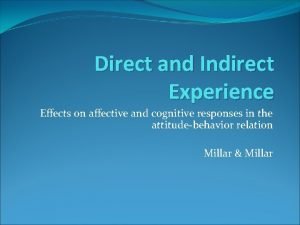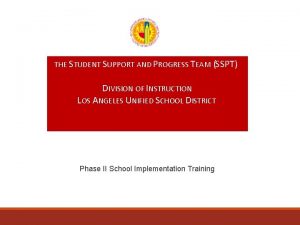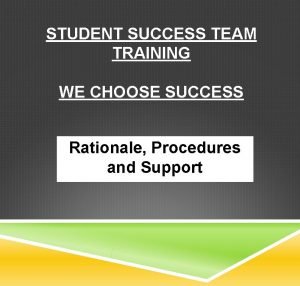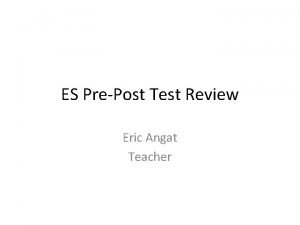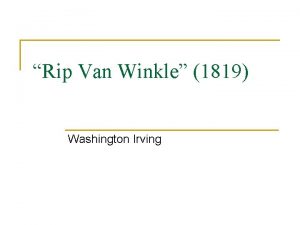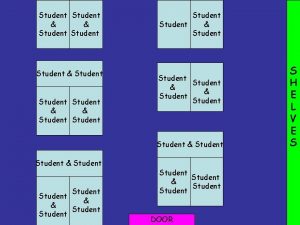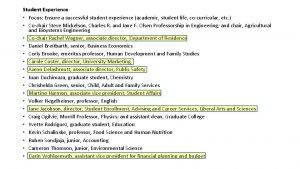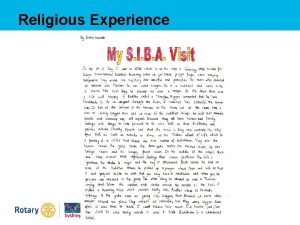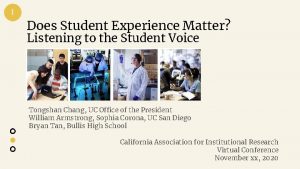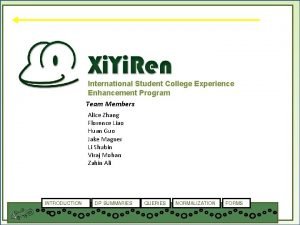Psychology Student Experience Team What does the Psychology















- Slides: 15

Psychology Student Experience Team

What does the Psychology Student Experience Team do? • • Monitor your attendance and signpost you to support and advice Work closely with the Psychology Director of Student Experience to answer your queries Arrange student meetings to discuss how we can best support you in school to be able to complete your studies to the best of your abilities Work closely with the Student Life Centre, Student Support Unit, Student Systems and Records office and the Careers and Employability Centre to address and resolve any issues you may be experiencing or questions you may have • Administrate the Psychology Placement scheme • Work closely with the Psychology student mentors, student reps and the team promoting the Enlitened app to make sure your voice is heard • Organise and facilitate a calendar of event throughout the academic year from Welcome week to the Finalists party. We also run careers, placement and wellbeing events that have been requested and suggested by our students • We are a small team of three based in the Psychology school and are here to support your student experience

Additional support we recommend Student Support Unit Study skills resources: http: //www. sussex. ac. uk/skillshub/ If you have a learning disability or an on-going physical or mental health condition, we would strongly recommend you register with the student support unit. They are available to support and advise you with getting reasonable adjustments in place for your assessments and with applying for specialist study support funding. More information and be found here: https: //studentstage. sussex. ac. uk/assessment/reasonableadjustments The Student Life Centre can offer support on a range of issues related to your welfare. They can help with concerns affecting your wellbeing, money matters, improving your academic performance, understanding how the University works or anything you would like guidance on. More information can be found here: https: //www. sussex. ac. uk/studentlifecentre/

Why we do wellbeing events The 5 actions to improve personal mental wellbeing along with related examples of our events: 4. Learn: Continued 1. Connect: learning through new experiences and There is strong evidence that indicates feeling close to, and opportunities enhances self-esteem and encourages valued by other people is a fundamental human need and social interaction and a more active life: one that contributes to functioning well in the world: Knitted together, Crafternoon, Careers over coffee, Student socials, Board games, Charity events Awareness days 2. Be active: Regular 5. Give: physical activity is associated with lower rates of depression Individuals who report a greater interest in helping and anxiety across all age groups. Exercise can improve others are more likely to rate themselves as happy. cognitive ability and promote wellbeing: Nature walks, Participation in an act of kindness is associated with an Relaxation yoga increase in wellbeing: Volunteer fair, Pets as Therapy, Crafternoon, Charity events 3. Take notice: Reminding yourself to ‘take notice’ can strengthen and broaden awareness. Studies have shown that being aware of what is taking place in the present directly enhances your well -being and savouring ‘the moment’ can help to reaffirm your life priorities: Nature and wellbeing walks, Creative mindfulness

Events we organise We want you to feel you can feedback to us to ensure we are providing the most beneficial and enjoyable experience. Our events allow us to build relationships with our students. We’d like you to feel you can come to us with any queries or concerns you may have.

Our doggy de-stress events are always popular. Some dogs owned by staff visit us but often we organise for the volunteers from charity Pets as Therapy to bring their amazing canine friends to help you de-stress.

We organise social events so you can meet other psychology students on the course. Those with similar subject interest, in other teaching groups or other years of the course.

We organise wellbeing events throughout term time and assessment periods.

Placements – Frequently Asked Questions What are the benefits of a placement year? The biggest benefit of completing a placement year is having a year’s worth of work experience when you graduate. This will make you more attractive to employers compared to students on the 3 year programme. It is also a great opportunity to explore a career you are interested in. Our students often tell how useful the year was to understand what they want and don’t want in a future job. Furthermore, whilst on placement you will often meet and work with staff across the organisation allowing you to build your professional network. The connections you build on placement can lead to future opportunities and training. Academically, returning placement students tend to do better in their final year. This is because they are able to get a deeper understanding of psychological theory having seen it in action in the real world. When would I complete a placement year? You would complete your placement year after your second year of study. Start dates typically occur between July-September. After completing your placement you would return for your final year of study. How long is a placement year? The minimum duration of all placements is 40 weeks full time, however industry/business placements typically last 12 months. Students completing unpaid placements within the NHS and charitable sector must complete a minimum of 30 weeks, for at least 4 days a week.

Would I be paid for my placement year? All business/industry placements pay a salary. The university does not promote or authorise unpaid placements. The only exception to this are roles within the NHS or charities which are unpaid. Some unpaid placements may pay travel expenses. Students completing these unpaid placements will work part time (4 days a week) to allow them to also pick up a paid weekend job if needed. Do I pay tuition fees on placement? Yes, although the fees are significantly lower. The placement year is part of your course and you will have contact with the University throughout the placement and will complete assessments as normal. Tuition fees are 20% of the normal course fee for the year. Is Student Finance funding available during my placement year? Yes. Students completing a placement year can apply for both a tuition fee loan and an optional maintenance loan. The amount of maintenance loan you are eligible for will depend on the type of placement you are completing – paid, unpaid or unpaid service. Typically, students completing unpaid roles within the NHS and charities will receive the same level of maintenance loan as previous years of study. Can I work internationally? Definitely. We have had students secure and complete placements in Norway, The Netherlands and Hungary so far. Does the placement year count towards my degree? The placement year module is worth 120 credits (equivalent to a full academic year) and you will complete monthly assessments throughout the year. These credits do not count towards your final degree classification and the final portfolio is marked on a pass/fail basis. Successful completion of a placement will be recorded on your final transcript. I’m not sure about completing a placement, what course shall I choose on UCAS? All Psychology undergraduate students are eligible to complete a placement year. You do not have to have joined us on the 4 year with a professional placement programme. If you do join us on a 3 year programme you can still apply for placements and you will have access to the same support as those on a 4 year programme. Should you secure a placement we can easily transfer you onto a 4 year programme.

Would I be guaranteed a placement? Unfortunately not. Applying for placements is much like applying for a job – it can be competitive! To secure a placement, you may need to progress through various stages for example, CV/application, psychometric testing, assessment centre, final interview. This sounds scary but there is lots of support available within the School and the Careers centre to help students at every stage. What happens if I do not secure a placement? What support is available in school? Psychology as a subject is very broad and lends itself to a wide variety of careers. Typical roles our students will secure are: When you join the university you will be added to an online module dedicated to the placement year. This site provides comprehensive support in finding a placement. You will also have access to an online jobs board which advertises hundreds of placement opportunities every year. As a school we have built partnerships with many local NHS trusts and charities who will advertise their placements with us every year. We have put together a series of workshops and face to face support sessions throughout your 1 st and 2 nd year to support you in each stage of the placement process. For example, we have dedicated sessions on writing a professional CV, what to include in a cover letter, and how to succeed at interviews. We have a dedicated Careers Consultant, Sarah, who delivers these sessions to you. Sarah also runs drop-ins throughout the academic year to provide 12 -1 careers advice and placement support. If you do not secure a placement by the university deadline (normally July of your second year), you would be automatically transferred onto the 3 year programme. You would then go straight into your final year of study. What could I do on my placement year? • • Honorary Psychologist Teaching Assistant/Trainee SEN Teacher Research Assistant Support Worker Marketing Assistant Student Analyst Human resources/recruitment Typical organisations/settings our students will go into: • • • NHS Trusts School Charities Other universities/research organisations Prisons/secure hospitals Industry/big business

During the Placement What support would I receive whilst on placement? Where do I live on placement? We have a team of Placement Tutors here in the School who are there to support you throughout the placement year. You will be allocated a Placement Tutor who will be your main point of contact during your placement. They will check in with you periodically and come and visit you in person halfway through your placement. This will depend where you secure your placement. Some students choose to stay in Brighton and commute, whilst others move to an entirely new city. Some students on unpaid placements will also choose to move home for the year to save money. You are still a registered student whilst on placement therefore you can continue to access the on-campus facilities such as the Students Union, library, sports centre and Student Life centre etc. If you have any further questions, please email us via psychologyplacements@sussex. ac. uk In December you will be invited back to campus for a “Return to Campus” day. This is an opportunity to connect with other Psychology students on placement and attend workshops designed to enhance the remainder of your placement.

Study Abroad as a Sussex Student We have one of the best study abroad programmes in the UK with over 140 universities worldwide to choose from. This includes high-ranking universities in the United States, Europe, Latin America and Asia. You can apply to study abroad on all of our undergraduate courses. Where you can study abroad will depend on your course and the availability and number of places at the partner university. If accepted for a study abroad year, your course is extended by a year and you'll go abroad in Year 3. Even if you don't speak another language, there are plenty of destinations for you to choose from. You can study at: English-speaking destinations like the US or Australia our partner universities in Asia, all of which offer courses taught in English selected universities in Europe (particularly Sweden, Norway, Germany, France and Spain) some of which have academic courses in English. Other opportunities for going abroad include teaching English as a British Council Language assistant or going on a work placement in a country where your language of study is spoken. How to apply You'll apply for a place through the Study Abroad team, usually the year before you are planning to go abroad. For example, if you're planning to study abroad in between your second and third year of study at Sussex, you apply for a place at your chosen partner university at the start of Year 2. The Study Abroad team run regular events about studying abroad and can help you decide which partner university is best for you. Email the Study Abroad team via: sussexabroad@sussex. ac. uk

Careers and Employability We organise various Careers and Employability events in school to give students the opportunity to learn directly from psychology professionals and network with local organisations to gain relevant work experience. We also work closely with our Psychology careers advisor in the Careers and Employability Centre. http: //www. sussex. ac. uk/careers/

Before autumn term starts, we hold a number of events in school during welcome week. You get to meet fellow students and faculty at a social event and learn about the course in welcome lectures. We have Psychology UG and PG online canvas sites where you will find information on welcome week, how to find your way around campus, support services and general course information. We also hold an information fair in school, where you can find out information on: • • • Psychology first year retreat days Psychology student mentors Psychology society University Buddy scheme Enlitened app We look forward to meeting you!
 Imprinting meaning psychology
Imprinting meaning psychology Early experience vs later experience
Early experience vs later experience What is indirect experience
What is indirect experience Team spirit becomes team infatuation
Team spirit becomes team infatuation Team spirit becomes team infatuation
Team spirit becomes team infatuation The white team cheers for the blue team, just like
The white team cheers for the blue team, just like Sspt meeting
Sspt meeting Student team reading
Student team reading Student success team
Student success team Why does earth experience precession? *
Why does earth experience precession? * Allegory in rip van winkle
Allegory in rip van winkle How's your last weekend
How's your last weekend We ...... a big piece of wood last saturday. (see)
We ...... a big piece of wood last saturday. (see) Clearinghouse student tracker
Clearinghouse student tracker Class maths student student1 class student string name
Class maths student student1 class student string name National student clearinghouse student tracker
National student clearinghouse student tracker


